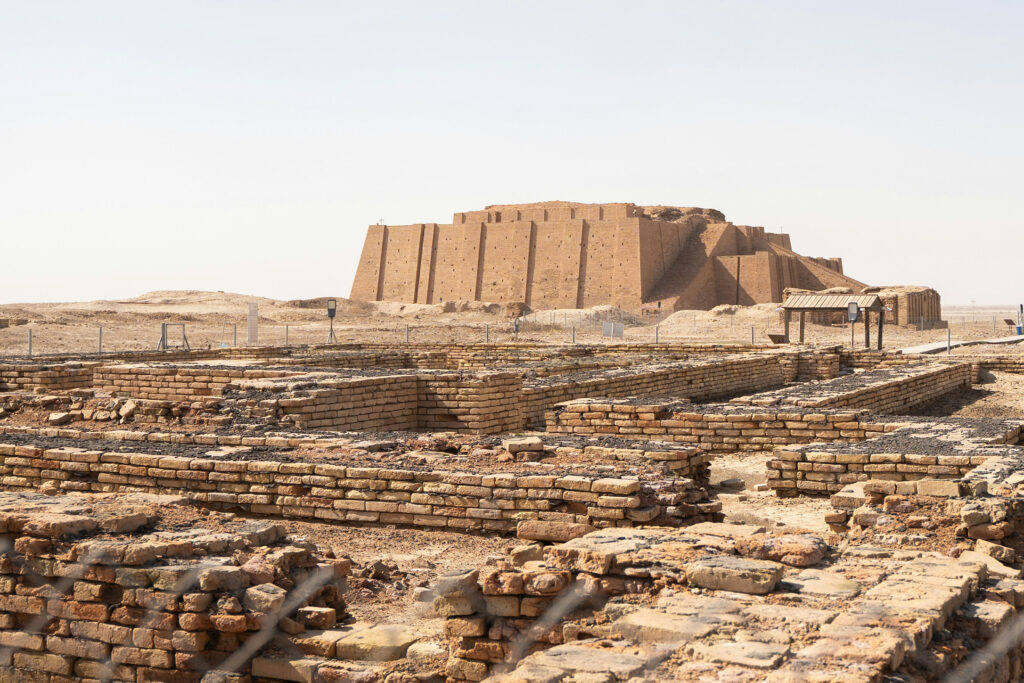“Now the whole earth had one language and the same words. And as people migrated from the east, they found a plain in the land of Shinar and settled there. And they said to one another, ‘Come, let us make bricks, and burn them thoroughly.’ And they had brick for stone, and bitumen for mortar. Then they said, ‘Come, let us build ourselves a city and a tower with its top in the heavens, and let us make a name for ourselves, lest we be dispersed over the face of the whole earth.’ And the Lord came down to see the city and the tower, which the children of man had built. And the Lord said, ‘Behold, they are one people, and they have all one language, and this is only the beginning of what they will do. And nothing that they propose to do will now be impossible for them. Come, let us go down and there confuse their language, so that they may not understand one another’s speech.’ So the Lord dispersed them from there over the face of all the earth, and they left off building the city. Therefore its name was called Babel, because there the Lord confused the language of all the earth. And from there the Lord dispersed them over the face of all the earth.” (Genesis 11:1-9 ESV)
In Genesis chapter 10, we saw the nations of the earth first introduced. In chapter 11, we find the first story of God’s work among those nations. This passage serves as the foundational explanation of God’s relationship with the nations and their status before him.
These verses may sometimes be presented as a story designed to satisfy our curiosity as to why there are so many languages in the world. But that is not this passage’s main purpose; that’s not why it is placed here in Scripture. This story teaches us several important principles about God and the nations that are vital for us to understand as we read all the rest of Scripture that follows.
Here are three principles that we can clearly see from this passage:
1. God created all the nations, and they belong to him.
Psalm 86:9 explains to us that “all the nations you have made shall come and worship down before you, O Lord, and shall glorify your name” (ESV, emphasis added). The nations, boundaries, languages, and peoples of the earth did not arise from random mistakes in history. God created them, and they are part of his purposeful plan. The story of the Tower of Babel teaches us that God is the rightful Lord and ruler of the entire world.
This principle is made plain in Colossians 1:16, where Paul teaches that both the rulers and the nations that they rule are created through Christ for his glory:
For by him all things were created, in heaven and on earth, visible and invisible, whether thrones or dominions or rulers or authorities—all things were created through him and for him.
2. All the nations have rebelled against their creator and rightful ruler.
Noah and his descendants were specifically instructed to multiply and spread across the earth in Genesis 9:7, “but you, be fruitful and multiply; spread out over the earth and multiply on it” (CSB, emphasis added). The first group decision of the nations was to do the exact opposite of those divine instructions. They said, “let us make a name for ourselves; otherwise, we will be scattered over the face of the whole earth” (Genesis 11:4 CSB, emphasis added).
Furthermore, in making their first decision, they were focused on their own glory rather than on God’s glory. Their stated desire was to make a name for themselves. Their motive was their own selfish pride, without thought for the will and glory of their creator.
3. God’s plan for the nations cannot be thwarted.
Despite the decision and intention of the nations, it was God’s will, not theirs, which was accomplished. At the end of the story of the Tower of Babel, the nations did indeed scatter across the earth just as God had instructed, which was the opposite of their original plan to stay together.
We can clearly see that God is ultimately in charge of the earth and its inhabitants, not the human rulers of the nations. Throughout the rest of Scripture (and human history), we can see many human rulers who had to learn this lesson the hard way. Pharaoh, Ahab, and Nebuchadnezzar are some of the most famous examples of human rulers who learned that their creator God was really in authority, not themselves. Human rulers today are still learning this lesson the hard way as they attempt to lead governments in ways that are contrary to God’s will.
Nebuchadnezzar summarized the principle that God’s plan for the nations will always be accomplished when he made his international proclamation recorded in Daniel 4:35, “. . . He [God] does according to his will among the host of heaven and among the inhabitants of the earth; and none can stay his hand or say to him, ‘What have you done?’
Prayer:
Lord, you are the rightful King over all the earth. Help us to love the people of all the nations you have made. We pray that people of every nation would worship you.
In Jesus’ name, amen.
Prayer Requests:
- Pray for laborers to carry the gospel to every language group, people, and nation.
- Pray for ongoing translation projects that seek make Scripture and Bible study materials accessible in languages in which they do not currently exist.
- Pray for you and your church to maintain a biblical attitude toward people from other cultures and language groups.






